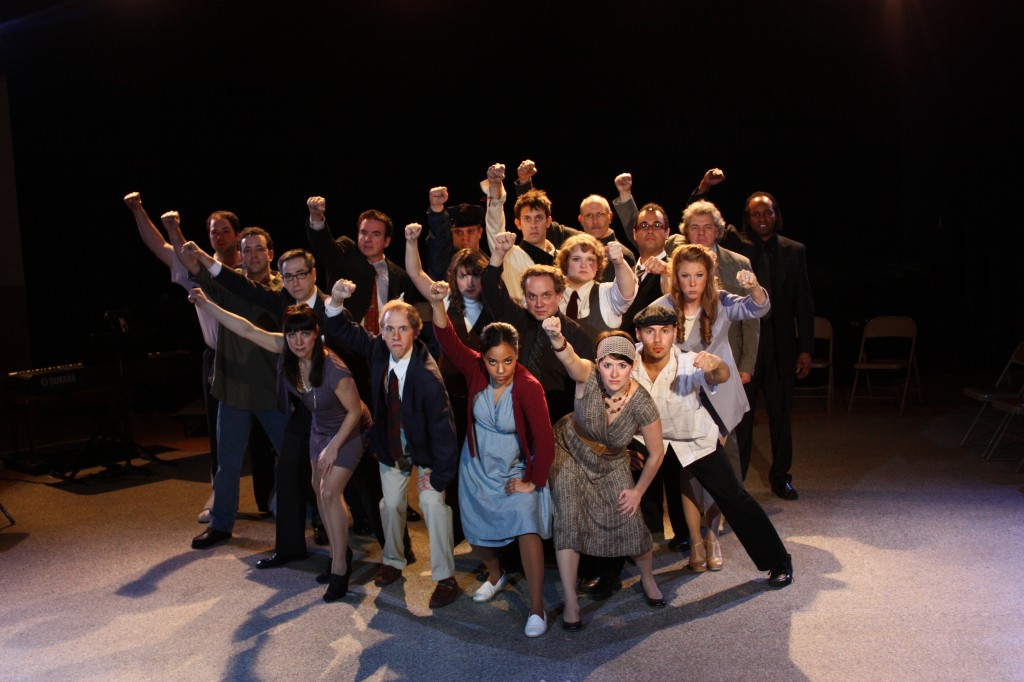
Unionize! (photo credit David Fuller)
“Why don’t you write a piece about all kinds of prostitution – the press, the church, the courts, the arts, the whole system?” asked Bertolt Brecht of Marc Blitzstein in 1937 after hearing Blitzstein’s song “The Nickel Under the Foot” (Oh you can dream and scheme and happily put // And take, take and put // But first be sure // That nickel’s under your foot // Go stand on someone’s neck while you take him // Cut into somebody’s throat as you put // For every dream and scheme, depending on whether // All through the storm // You’ve kept it warm // That nickel under your foot ), and so began Blitzstein’s creative journey to create “The Cradle Will Rock” which is a musical portrayal of exactly that. The greedy Mr. Mister, his vapid, silly, hedonistic family, his easily-controlled preacher, his wife’s pet artists, and some of the good people who needlessly get crushed under his wheels as they try to unionize in “Steeltown, USA” under the direction of their leader, Larry Foreman.
A little more history – The Cradle Will Rock was considered too controversial to stage and the theatre was shut down before it actually got to raise the curtain on its first performance so it wasn’t staged as intended. Instead, another theatre was rented and Blitzstein himself took the stage alone, with a piano, to do a cold performance of the musical. However other cast members, peppered around the audience, joined in and sang their lines from their seats (thus getting around Actor’s Equity which didn’t allow them to perform onstage). Tim Robbins’ movie “Cradle Will Rock” showcases this historic moment.
Taking a paragraph from this page in Blitzstein’s history, Theater Ten Ten’s Director and Set Designer, David Fuller does not utilize the stage much in this latest offering of The Cradle Will Rock, but rather opens up the entire audience space having the cast perform directly from the floor, and sometimes even uses seats among the audience members. It’s a nice homage to a bit of history, as well as a clever way to gain more performance space for some of the bigger, more aggressive and rousing stage numbers. Though at times Judith Jarosz’s choreography relies a bit too much on long strolls in order to cover the entire space, and characters are often positioned on opposite ends of the performance space leaving the audience to swivel their heads back and forth as if in a tennis match. Still, it’s mostly effective, as long as you’re an audience member who’s comfortable with house lights that never dim leaving you with a feeling of being part of the production yourself.
As the show begins it becomes apparent that this was written to be sung-through – a technique one usually finds in opera to fill in the spaces between the major arias. Personally, I can’t stand the technique, it leaves you with a lot of non-melodic lines that are more distracting than engaging, and can often be laborious to follow – when everything is sung but nothing is a song it can be disconcerting. Of course, again, this was written in 1937 so to critique the long-dead writer isn’t particularly fair. I would, however, have been interested to see a little creative license taken with this project; forceful lines spoken over the same score might have been another way to go.
Eric Thomas Johnson as Musical Director and Accompanist does an amazing job at creating a musical ambiance throughout and is masterful at what he does; so much so that you often forget that he’s the only musician present.
The show takes a little time to warm up to, and unless you’re very fond of the time period, a song about crooning and spooning with references to Greta Garbo and Gary Cooper date the show in a way that the other musical numbers don’t. Yes yes … I get it … this is 1937. However, many of the themes of this piece are greed, love, naiveté, longing for a leader, and pure class struggle which are still alive today. Crooning and spooning? Not so much. A little bit of cutting here would have brought the piece to the audience faster (although Michael Baxter as Junior Mister and Elizabeth Kensek as Sister Mister put their all into a number that’s got more froth in it than Jessica Simpson’s bubble bath). They do manage to pull the mood up quickly with a fun little number that gets the audience’s attention again – well staged, choreographed and devised this little ditty about Honolulu (a not so subtle attempt to ship Mr. Mister’s [Bill Newhall] son as far away from the action as possible) is delightful and does just what it’s intended to do which is kick the show into gear.
As the story of Mr. Mister and his corruption unfolds an unexpected touching moment – in my opinion one of the deepest moments of the play – comes from two of the background players, Gus (David Janett) and Sadie (Sarah DeLaney), who are somewhat incidental characters but play a pivotal role during one illustrative scene. Their simple, honest, beautiful song of promise; belief in the American dream; and faith in each other brought tears to my eyes and will resonate with any person who has come from (or has parents or grandparents who have come from) another land in the hopes of making a better life for their family in America. And isn’t that everyone – especially those of us here in New York?
Another number by the two artists, Yasha (Matthew James Gray) and Dauber (Greg Horton) set off a decidedly Balki/Cousin Larry type vibe (which I don’t think was unintentional; Matthew James Gray has a Mark Linn Baker quality to his performance that is unmistakable). Casting these two fine performers together as the artists who exploit Mrs. Mister (Tessa Faye) for her generous gifts, dinners, and contributions definitely works and added a great veneer of comedy to this story.
When Larry Foreman (Josh Powell) finally comes on to the scene he gets a big song; it’s bombastic and rousing and has all the elements of a perfect rallying cry to unionize and yet (again, this is a note for the long-dead composer Blitzstein) the song is just tuneless and dissonant enough to become immediately forgettable moments after the last huge note belted by Mr. Powell is still hanging from the rafters. Mr. Powell has great charisma and all the elements of a true star; it’s obvious from his performance that he’s a real talent, but the role of Larry Foreman just doesn’t have songs that match his enormous ability.
The cast of almost 20 members are all passionate, talented, and when each steps from the ensemble to perform their respective piece it’s obvious that they can shine brightly before stepping back and giving their all as a group – a true union, to be a bit clever about it. And seeing this group come together with such passion is wonderful. While the subject matter of the piece didn’t exactly grab me, and while the tunes themselves often left me flat there is no doubt that this cast is a supremely talented one.
If you’re interested in seeing an old classic like The Cradle Will Rock brought back to the stage (or, in the case, the floor), then by all means, make sure you get to Theatre Ten Ten. While it isn’t Sondheim, it’s a part of our history and that’s often reason enough.
~~~
The Cradle Will Rock Theater Ten Ten 1010 Park Avenue New York, NY 10028 Feb. 26-28 March 1, 5-8, 11-14. All Friday, Saturday, & Monday performances are at 8:00pm All Sunday performances are 3:00pm matinees only. There is one Thursday performance March 11 which is an early 7:00pm curtain. Tickets and Reservations: All tickets are $25.00 Credit card at Theatermania.com or call 212-352-3101


{ 0 comments… add one now }